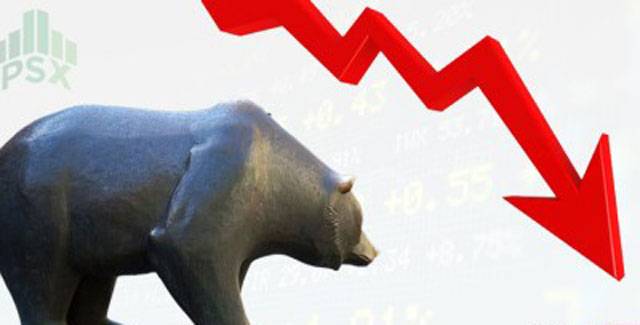Lahore - The index plummeted for the fifth consecutive week with benchmark KSE-100 index posting 1.1 percent WoW decline to close at 38,646 points level.
However, a late recovery was seen on Friday after the Supreme Court rejected NAB's appeal for the reopening of Hudaibya case. While political concerns continued to weigh down on the index, lack of clarity on the macroeconomic front also continued to dent investors’ confidence.
A major development on the macroeconomic front was seen during the week as the State Bank of Pakistan (SBP) let the Rupee fall by 6 percent against the Greenback, reportedly after partially agreeing to IMF's demands of over 15 percent demands. Although it addressed concerns to some extent, the depreciation failed to excite market participants as it failed to meet expectations of perceived currency value. IMF's positive comments on PKR devaluation and decoupling of economy and politics also failed to create interest in the market. As a result of jumbled up political and macroeconomic concerns, foreign and local individual investors continued their selling spree and recorded net selling of $8.4 million and $1 7 million worth of equities. Across the board selling was observed with heavyweights such as Cements (down 6.0 percent WoW), OMCs (down 1.1 percent WoW), Banks (-0.5 percent WoW) and Autos (down 3 percent WoW) extending losses.
Some gains were posted by E&Ps (up 1.4 percent WoW), but the performance remained insufficient to counter across-the-board free-fall. Market participation also suffered with average traded volumes (down 4.4 percent WoW to 135 million), witnessing a decline.
Experts said that Benchmark KSE-100 index fell 1.1 percent WoW to close at the 38.6k mark. Volatility in currency and political uncertainty, where National Assembly Speaker’s comments that assemblies would not complete their tenures, led the market falling to new lows.
Stocks including LUCK (-8 percent WoW), ISL (-11 percent), DGKC (-7 percent), SEARL (-7 percent) and UBL (-2 percent) held 255pts from the index, while PPL (+3 percent), ENGRO (+3 percent), HBL (+2 percent), OGDC (+1 percent) and SNGP (+5 percent) added 208pts. On the sector front; Engineering & Refineries shed 8 percent, Cement & Pharma were down 7 percent, Autos lost 3 percent, Banks -1 percent, while E&Ps & Fertilizer gained 1 percent & Tobacco was up 2 percent.
Foreigners sold $8.9m during the week (vs. buying of $1.0m last week). On the local front, banks were net the buyers of $11.3 million worth of shares whereas individuals were net sellers of $17.8 million.
Prime Minister Shahid Khaqan Abbasi said during the week that his administration had “no plan” to weaken the rupee further after the central bank started devaluing the currency last week. The drop makes rupee the biggest decliner globally since Dec. 8. The weaker rupee will have a minimal impact on the economy with an inflationary “impact probably of less than 0.5 percent.
Abbasi said the “market will decide” the rupee’s level and that the move would help address Pakistan’s external position.
Shahid Mahmood, the secretary at the finance ministry, said the government had the option to raise funds by selling more global debt or seeking commercial loans from Chinese banks, instead of going to the IMF to bridge its financing gap, he said.“We are familiar with procedures so if we have to go to the market we can easily do that within 45 days,” Mahmood said in a phone interview on Friday.
The government would potentially raise a smaller amount than November’s sale and will watch the economic situation for two months before taking a decision, he said. The World Bank estimated in October that $17 billion of external financing -- or 5 percent to 6 percent of gross domestic product -- is needed in the current financial year through June for Pakistan to bridge its debt payments and current account deficit, which more than doubled to $14.4 billion in the year through September.
The bill regarding the fresh delimitation of constituencies will be tabled in the Senate on December 19, parliamentary party leaders agreed during a meeting chaired by Prime Minister Shahid Khaqan Abbasi. According to sources, grievances of parliamentary leaders regarding the delimitation bill were addressed in the meeting. Speaking to the media, Senator Aitzaz Ahsan said it has been decided that in line with the opposition’s objections on the census, the government will randomly select 5 percent of census blocks for a re-audit within 30 days. "Our mechanism of a re-audit has been accepted by the government and the PM himself has assured to monitor and take responsibility for it".
Nishat Mills (NML) notified the bourse that Hyundai Nishat Motors (HNML) has planned groundbreaking for auto manufacturing project on Dec 20, 2017, while its new spinning facility with 49.5k spindles (22k relocated) will commence commercial production on the same date.






